Up Your Antioxidant Intake with These Easy Steps
Antioxidants are important, but this article delves into why they're important and how to add more antioxidants to your diet easily.
- Published: 2/15/2018
- Categories:
- 3 min. read

- Published: 2/15/2018
- Categories:
- 3 min. read
Antioxidant is a big word with an even bigger job when it comes to our health. The root word of antioxidant is oxygen. When we breathe, red blood cells deliver oxygen to every cell in our bodies, so they can metabolize nutrients and convert them into energy. But beneficial oxygen has a dark side, too. Oxygen is highly reactive, and metabolizing fuel produces dangerous waste particles called free radicals. Free radicals are a normal by-product of metabolism, but they can damage healthy cells, leading to premature aging and serious health concerns like cancer and heart disease.
Free radicals have an unpaired electron, so their goal is to stabilize themselves by capturing an electron from another atom, often from proteins and even our DNA. Stealing electrons leads to a chain reaction that creates even more free radicals and leads to oxidative stress. Oxidative stress is an imbalance caused when the production of free radicals exceeds the body’s ability to detoxify their harmful effects with antioxidants.
Let’s look at a few easy steps to increase your daily antioxidant intake, so you can help protect your body from damaging free radicals.
Eat Antioxidant-Rich Foods
The more antioxidants we consume, the better we can fight the damaging effects of free radicals. Spices like cinnamon and chili pepper are jam-packed with antioxidants, and so are herbs like oregano and basil. Sprinkle some cinnamon on an apple slice or toss some wild blueberries on a bowl of cereal. Wild blueberries have an oxygen radical absorbance score of 9621, while aromatic cloves scored an outstanding 290283.
Loaded with antioxidants, green leafy veggies like spinach and kale mix well in a green smoothie if you don’t like their taste. Nuts like walnuts and pecans are a great antioxidant-rich food that’s easy to pack for a quick afternoon snack. Loaded with beta-carotene, colorful foods like carrots or sweet potato are a healthy side dish that’s also delicious. Lifesum’s fruit tracker is the ideal way to keep track of the antioxidant-rich foods in your diet to confirm that you’re getting your fill.
Prepping Methods Matter
How you prepare your food affects its nutrient content. As a general rule, raw fruits and veggies make the most impact when it comes to fighting free radicals, but you don’t have to eat like a rabbit to benefit. An apple’s peel has 30 percent more antioxidants than its pulp, so keep the skins on, and roughly chop your foods instead of dicing them. Steaming or quick cooking on high heat are the best ways to retain nutrients like antioxidants.
Use a Nutrition-Tracker
Lifesum’s nutrition-tracker app gives you a detailed breakdown of your daily food intake. With pre-programmed food ratings built right in, you can balance your meal choices with their overall healthy score before you put them in your mouth. Keep track of your antioxidant intake so you can make sure your body is getting the free-radical protection it needs.
With Lifesum’s nutrition tracker’s hard-and-fast numbers, you might be surprised by how easy it is to add a variety of antioxidants into your daily life.
All of the content and media on Lifesum is created and published for information purposes only. It is not intended to be used as a substitute for medical advice or treatment. Users should always consult with a doctor or other health care professional for medical advice. If you have or think you are at risk of developing an eating disorder, do not use the Lifesum app and seek immediate medical help.